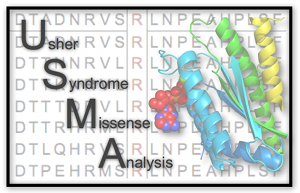 |
You will find below accession numbers for ortholog sequences used in USMA, and also references. Accessions beginning with "ENS..." are related to Ensembl, others generally come from NCBI. Clicking on one gene name will display accession numbers and links to the original sequence.
Accession numbers: (display/undisplay all).
- MYO7A
- USH1C
- CDH23
- PCDH15
- USH1G
- USH2A
- VLGR1
- WHRN
- USH3A
References:
- Flicek P, Aken BL, Beal K, Ballester B, Caccamo M, Chen Y, Clarke L, Coates G, Cunningham F, Cutts T, Down T, Dyer SC, Eyre T, Fitzgerald S, Fernandez-Banet J, Gräf S, Haider S, Hammond M, Holland R, Howe KL, Howe K, Johnson N, Jenkinson A, Kähäri A, Keefe D, Kokocinski F, Kulesha E, Lawson D, Longden I, Megy K,
Meidl P, Overduin B, Parker A, Pritchard B, Prlic A, Rice S, Rios D, Schuster M, Sealy I, Slater G, Smedley D, Spudich G, Trevanion S, Vilella AJ, Vogel J, White S, Wood M, Birney E, Cox T, Curwen V, Durbin R, Fernandez-Suarez XM, Herrero J, Hubbard TJ, Kasprzyk A, Proctor G, Smith J, Ureta-Vidal A, Searle S.
Ensembl 2008.
Nucleic Acids Res. 2008 Jan;36(Database issue):D707-14. Epub 2007 Nov 13.
Pubmed.
- Larkin M.A., Blackshields G., Brown N.P., Chenna R., McGettigan P.A., McWilliam H., Valentin F., Wallace I.M., Wilm A., Lopez R., Thompson J.D., Gibson T.J., Higgins D.G. Clustal W and Clustal X version 2.0. Bioinformatics, 2007, 23, 2947-2948.
Pubmed.
- Dereeper A.*, Guignon V.*, Blanc G., Audic S., Buffet S., Chevenet F., Dufayard J.F., Guindon S., Lefort V., Lescot M., Claverie J.M., Gascuel O. Phylogeny.fr: robust phylogenetic analysis for the non-specialist. Nucleic Acids Res. 2008 Jul 1;36(Web Server issue):W465-9. Epub 2008 Apr 19.*: joint first authors.
Pubmed.
- Hulo N., Bairoch A., Bulliard V., Cerutti L., Cuche B., De Castro E., Lachaize C., Langendijk-Genevaux P.S., Sigrist C.J.A. The 20 years of PROSITE. Nucleic Acids Res. 2007 Nov 14.
Pubmed.
- R.D. Finn, J. Tate, J. Mistry, P.C. Coggill, J.S. Sammut, H.R. Hotz, G. Ceric, K. Forslund, S.R. Eddy, E.L. Sonnhammer and A. Bateman. The Pfam protein families database. Nucleic Acids Research (2008) Database Issue 36:D281-D288
Pubmed.
- Venn diagram is inspired of Wikipedia (french site, no copyright). An english version (png) can be found
in the personal page of Robert Russel at embl. The original diagram is adapted from Livingstone C.D., Barton G.J.
Protein sequence alignments: a strategy for the hierarchical analysis of residue conservation. CABIOS, 9, 745-756, 1993.
Pubmed.
- Tavtigian S.V., Greenblatt M.S., Lesueur F., Byrnes G.B.; IARC Unclassified Genetic Variants Working Group. In silico analysis of missense substitutions using sequence-alignment based methods. Hum Mutat. 2008 Nov;29(11):1327-36.
Pubmed.
- Greenblatt M.S., Beaudet J.G., Gump J.R., Godin K.S., Trombley L., Koh J, Bond J.P. Detailed computational study of p53 and p16: using evolutionary sequence analysis and disease-associated mutations to predict the functional consequences of allelic variants. Oncogene. 2003 Feb 27;22(8):1150-63
Pubmed.
- Jones D.T. Protein secondary structure prediction based on position-specific scoring matrices. 1999, J. Mol. Biol. 292: 195-202.
Pubmed.
- Chou P.Y., Fasman G.D. Prediction of protein conformation. Biochemistry. 1974 Jan 15;13(2):222-45.
Pubmed.
- Chou P.Y., Fasman G.D. Prediction of the secondary structure of proteins from their amino acid sequence. Adv Enzymol Relat Areas Mol Biol. 1978;47:45-148.
Pubmed.
- Creighton T.E. Proteins Structures and Molecular Principles W.H. Freeman, New York, 1983.
- Costantini S., Colonna G., Facchiano A.M. Amino acid propensities for secondary structures are influenced by the protein structural class. Biochem Biophys Res Commun. 2006 Apr 7;342(2):441-51.
Pubmed.
- Crooks GE, Hon G, Chandonia JM, Brenner SE. WebLogo: a sequence logo generator. Genome Res. 2004 Jun;14(6):1188-90.
Pubmed.
- Contreras-Moreira B, Bates PA. Domain fishing: a first step in protein comparative modelling. Bioinformatics. 2002 Aug;18(8):1141-2.
Pubmed.
- Eswar N, Eramian D, Webb B, Shen MY, Sali A. Protein structure modeling with MODELLER. Methods Mol Biol. 2008;426:145-59.
Pubmed.
- The PyMOL Molecular Graphics System, Version 0.99, Schrödinger, LLC. http://www.pymol.org/
- Jmol: an open-source Java viewer for chemical structures in 3D. http://www.jmol.org/
- Chen VB, Arendall WB 3rd, Headd JJ, Keedy DA, Immormino RM, Kapral GJ, Murray LW, Richardson JS, Richardson DC. MolProbity: all-atom structure validation for macromolecular crystallography. Acta Crystallogr D Biol Crystallogr. 2010 Jan;66(Pt 1):12-21. Epub 2009 Dec 21.
Pubmed.
- Sanner MF, Olson AJ, Spehner JC. Reduced surface: an efficient way to compute molecular surfaces. Biopolymers. 1996 Mar;38(3):305-20.
Pubmed.
- Heinig M, Frishman D. STRIDE: a web server for secondary structure assignment from known atomic coordinates of proteins. Nucleic Acids Res. 2004 Jul 1;32(Web Server issue):W500-2.
Pubmed.
- Krivov GG, Shapovalov MV, Dunbrack RL Jr. Improved prediction of protein side-chain conformations with SCWRL4. Proteins. 2009 Dec;77(4):778-95.
Pubmed.
- Doig AJ. Stability and design of alpha-helical peptides. Prog Mol Biol Transl Sci. 2008;83:1-52.
Pubmed.
- Koch O, Cole J. An automated method for consistent helix assignment using turn information. Proteins. 2010 Dec 13. doi: 10.1002/prot.22968.
Pubmed.
- Pons JL, Labesse G. @TOME-2: a new pipeline for comparative modeling of protein-ligand complexes. Nucleic Acids Res. 2009 Jul 1;37(Web Server issue):W485-91.
Pubmed.




